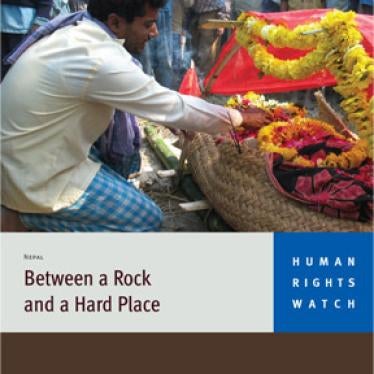(New York) - Nepal’s revised antiterrorism law will only worsen the problem of forced disappearances in the country, Human Rights Watch said today. Enacted without any parliamentary or other public review, the law allows the security forces to hold individuals in preventive detention for up to one year, without charge or trial and with no judicial oversight.
On October 13, King Gyanendra issued a new version of the much-criticized Terrorist and Disruptive Activities (Control and Punishment) Ordinance (TADO), which had lapsed earlier this year. Under the law, a Chief District Officer can now approve preventive detention orders for six months, without any recourse to the judiciary. This period can be extended for another six months with the approval of the home minister. In previous versions of TADO, the preventive detention period was limited to 90 days. The new law broadens the powers of the security forces, which have been responsible for systematic human rights abuses, including extrajudicial killings, disappearances, arbitrary arrests and torture.
“Given the scale of abuses by Nepal’s security forces, laws need to be put into place that give greater, not fewer, protections for Nepalis,” said Brad Adams, executive director of Human Rights Watch’s Asia division. “This law is a major step backwards. It’s likely to lead to more disappearances and more torture of people accused of being against the government or aligned with Maoist insurgents.”
In a recent report, “ Between a Rock and Hard Place: Civilians Struggle to Survive in Nepal’s Civil War,” Human Rights Watch documented how the Royal Nepalese Army acts with impunity in “disappearing” and executing suspected Maoists. The army routinely ignores habeas corpus orders from the Supreme Court ordering access to detainees, and it has repeatedly lied to the Supreme Court about the whereabouts of detainees in its custody. Moreover, the army has also failed to investigate and prosecute almost all cases of “disappearances” and summary executions, effectively allowing its soldiers free reign to commit abuses and fostering a culture of impunity.
According to the U.N. Working Group on Enforced and Involuntary Disappearances, Nepal in 2002 and 2003 led the world in the number of enforced disappearances by its security forces. Nepal’s National Human Rights Commission has documented more than 1,000 disappearances that remain unresolved. Most of the persons “disappeared” by Nepal’s security forces have likely been killed after interrogation.
“Nepal already leads the world in the number of persons who are ‘disappeared’ by its security forces,” said Adams. “The law could give the army a green light to continue its dirty work. Allowing the security forces to keep people in secret custody for up to a year, without access to the courts, is sending the wrong message to an army already out of control.”
Human Rights Watch noted that international experience shows that the most effective way to prevent “disappearances” and summary executions is to prevent the use of secret detention, and to ensure that detained persons are promptly brought before a judge and have access to their lawyers and families. The strengthened provisions of TADO, giving the security forces the power to hold people in unacknowledged preventive detention for up to a year, move Nepal in exactly the opposite direction.
Also important is an effective legislature, which can review and amend draft laws before adoption and can provide oversight over the behavior of the executive branch, including the army and police. However, because the king suspended all elected bodies and Nepal’s parliament in August 2002, no public or democratic debate took place prior to the promulgation of the new TADO.
“The issuance of this new law by fiat demonstrates that a new parliament urgently needs to be convened,” said Adams. “Laws of this importance should be the subject of public consideration and debate.”
Human Rights Watch pointed out that in April the Nepalese government made a public pledge at the annual U.N. Commission on Human Rights to uphold human rights and the laws of war in its fight against the Maoists. It also promised to conclude an agreement with the U.N. High Commissioner for Human Rights to allow the United Nations to provide assistance to the Nepalese government and the National Commission on Human Rights.






